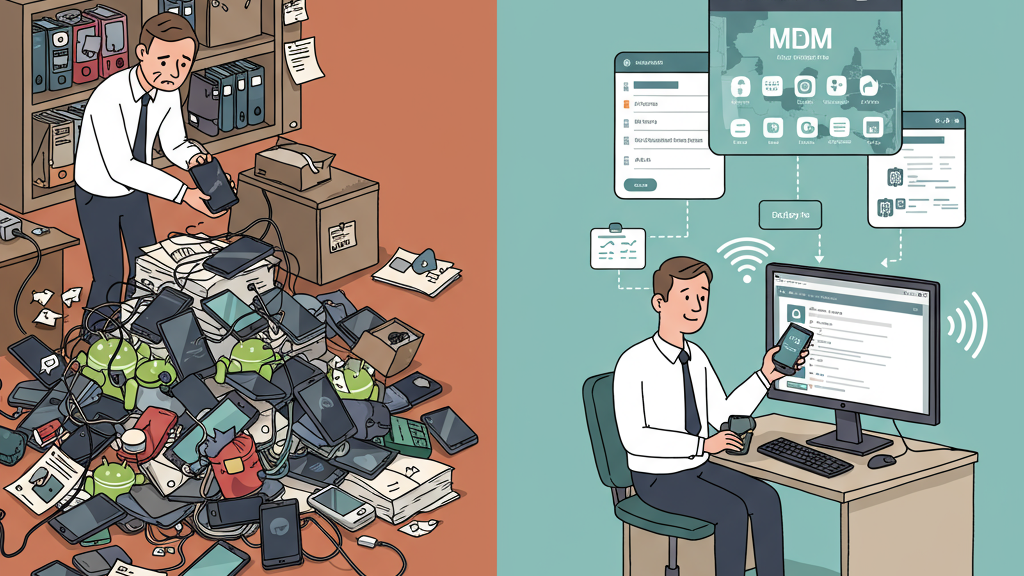In an era where mobile devices have become core enterprise assets, certificate management has transcended the server. It is a lot more than purchasing or renewing SSL/TLS certificates. It plays a crucial role in the mobile device management (MDM) ecosystem, silently safeguarding corporate network security and data integrity.
So, what exactly does enterprise certificate management mean in the context of MDM? It's more than just a collection of technologies; it's the key to building the foundation of trust in mobile workspaces.

What Is Enterprise Certificate Management In Android MDM?
Essentially, enterprise certificate management in MDM involves more than just establishing trust; it involves managing that trust throughout its lifecycle. Think of a certificate as a digital ID for every Android device. It proves to the enterprise network and applications that "I am an authenticated and trustworthy device." The MDM system acts as the "ID management center," responsible for issuing, renewing, reporting lost ID, and revoking this ID.
Without this "digital ID," the enterprise's Wi-Fi, VPN, and applications are like a locked room, inaccessible to devices. A certificate provides a unique key to this door. The value of MDM lies in making this key controllable: it can be precisely delivered to the devices that need it and immediately revoked when risks arise.
How MDM Helps Manage Enterprise Certificates
For example, when you use an MDM system to push certificates to employees' Android devices:
- 1. Automatic and secure network access: Employees no longer need to manually enter complex, easily intercepted Wi-Fi or VPN passwords. Devices automatically authenticate using certificates and securely connect to the enterprise network. This not only improves efficiency but also effectively prevents security risks such as man-in-the-middle attacks.
- 2. A trusted bridge between enterprise applications and resources: Only devices with specific certificates installed can access the company's internal email system, CRM tools, or customized applications. This ensures that even if a device is stolen, attackers cannot access sensitive data from an unauthenticated device.
- 3. A crucial credential for compliance: Many industry regulations require enterprises to implement strict security controls on devices connecting to their networks. Certificates, as proof of device identity and security, are a crucial step in meeting these compliance requirements.
In short, enterprise certificate management within MDM allows enterprises to not only declare to mobile devices, "I know who you are, and I trust you," but also ensure that "this trust is always controllable, traceable, and revocable."
Key Challenges and Solutions of Certificate Management for Android in MDM
Now that we understand the importance of certificates in the MDM ecosystem, let's examine why many enterprise IT teams still struggle with them. And how it presents a unique set of challenges, if not handled properly. This can directly translate into security vulnerabilities and business disruptions.
Here are the three most common roadblocks and their effective solutions:
1Challenge 1: Bulk Deploying Certificates to Diverse Android Devices

Pain Point Description:
Imagine your company has 500 salespeople, each using an Android device. When you need to deploy a new Wi-Fi certificate, the traditional approach might be to collect each device individually, manually connect them to a computer, and then configure them. This process is not only time-consuming and labor-intensive, but also prone to human error, leading to certificate misconfiguration and ultimately preventing some devices from connecting to the corporate network. If devices are distributed across cities or even around the world, this task becomes nearly impossible. Manual deployment is neither scalable nor adaptable to rapidly changing business needs.
Solution:
The key to addressing this challenge lies in automation and remote control. Professional MDM solutions, such as AirDroid Business, provide batch certificate deployment capabilities. IT administrators simply upload the certificate file to the management dashboard and select the devices or device groups to deploy. The system then remotely and automatically distributes the certificate securely to all targeted devices. This process requires no staff intervention, significantly improving deployment efficiency while ensuring consistent and accurate configuration.
2Challenge 2: Preventing Large-scale Certificate Expiration and Management Chaos
Pain Point Description:
Certificate expiration is the most common challenge in certificate management. For enterprises with a large number of Android devices, individually checking the certificate expiration dates on each device is nearly impossible. This often leaves IT administrators in a reactive state: IT teams intervene only when employees report that they are unable to access corporate resources due to expired certificates. This post-event remediation is not only inefficient but also causes business disruptions and impacts employee productivity. Worse still, if certificates are not updated promptly, the company's network security may be at risk.
Solution:
The key to addressing the risk of certificate expiration lies in shifting from decentralized to centralized management. MDM provides a unified console, allowing IT administrators to view detailed information about all certificates on all devices, including their expiration dates, at a glance. This centralized, visible management capability makes it easy for IT administrators to conduct regular reviews. When certificates are about to expire, administrators can preemptively push new certificates in bulk. This proactive, batched management approach greatly simplifies certificate maintenance, shifting from a "post-event" approach to a "pre-event" approach, ensuring certificates are always up-to-date, thus ensuring business continuity and security.
3Challenge 3: Immediately Revoking Certificates on Lost/Stolen Android Devices

Pain Point Description:
The high mobility of mobile devices is a major advantage, but it also presents significant security risks. If an Android device with a corporate certificate is lost or stolen, criminals can exploit the certificate to impersonate a legitimate device and infiltrate the company's internal network. In such emergency situations, traditional certificate revocation processes are often slow and complex. IT teams may spend hours or even days revoking certificates, during which time the company's security portal remains open.
Solution:
The most effective response to device loss emergencies is remote control and instant revocation. An MDM platform with integrated certificate management, such as AirDroid Business, can provide remote wipe or remote lock features. Once the IT administrator confirms the device is lost, they can perform these operations with a single click in the background. These operations not only delete all corporate data on the device but also forcibly revoke all deployed certificates. This immediate response prevents potential security threats before they occur, maximizing the protection of the company's network security and data assets.
AirDroid Business:Your Go-To Enterprise Certificate Manager for Android
In the previous section, we explored in detail the challenges of certificate management in Android MDM. Now, it's time to introduce a solution that completely addresses these issues.
AirDroid Business, an MDM platform designed specifically for Android devices and deeply integrated with enterprise certificate management, is more than just a tool; it's a powerful assistant that allows you to easily manage the complexities of certificate management. We fundamentally transform the traditional certificate management model, aiming to provide a more efficient, secure, and convenient solution.
One-Stop-Shop: Seamlessly Integrating Certificate Management with Android MDM
Traditional certificate management models often require IT administrators to use separate tools: one for device management (MDM) and another for certificate management (PKI). This fragmented tooling leads to cumbersome workflows, data incompatibility, and configuration errors, ultimately creating management silos.
AirDroid Business fundamentally solves this problem. It consolidates the entire certificate management lifecycle, from certificate upload, deployment, monitoring, and revocation, into a unified MDM console.
This seamless integration offers multiple benefits:
- 1. Simplified Workflow: No need to switch between different software interfaces. All certificate management tasks can be completed centrally on a single platform as part of your MDM management policy.
- 2. Data Interoperability: Certificate status is synchronized with device information (such as device model, employee information, and online status) in real time. If a device goes offline or is marked as non-compliant, the system can immediately link its certificate status, enabling rapid response.
- 3. Unified Policies: Easily set rules, for example, only devices that have successfully installed a specific certificate are considered compliant and allowed to access corporate resources. This significantly enhances security policy enforcement.
Through this one-stop experience, AirDroid Business not only improves work efficiency but also fundamentally strengthens an enterprise's security management capabilities, truly achieving "one-click solution for everything."
Automated & Remote Deployment: Simplifying Certificate Rollout at Scale
Manually deploying certificates for hundreds or even thousands of devices is an impossible task. AirDroid Business's automated deployment feature completely changes this situation. We've made large-scale certificate deployment easier than ever.
- 1. Easy Batch Deployment: IT administrators simply upload the certificate file in the management dashboard and select the devices or device groups to deploy to. The system then remotely and automatically distributes the certificates securely to all target devices. This process requires no manual intervention from employees and doesn't disrupt their daily work.
- 2. Remote Control, Precise and Efficient: Remote deployment is more than just installation. You can also remotely update, replace, or revoke certificates at any time, ensuring devices always have the latest and valid certificates. Whether you're dealing with urgent security needs or routine certificate updates, we offer the fastest response time.
- 3. Reduce Deployment Time: This highly automated process reduces deployment work that used to take weeks to just minutes. This not only saves significant time and labor costs but also ensures consistent and accurate configuration across all devices, eliminating human error.
By deeply integrating certificate management with the MDM platform and providing powerful automation capabilities, AirDroid Business transforms the previously complex, time-consuming, and error-prone certificate management task into a simple, controllable, and efficient process, allowing IT teams to focus on more strategic tasks and truly simplifying the complex.
AirDroid Business - Android Device Management
AirDroid Business is an Android device management solution that can be used to enroll, manage, and monitor large fleet devices. With the centralized platform, organizations are able to deploy smartphones, tablets, rugged devices and others dedicated devices like kiosks and digital signage.
It's available for Cloud Deployment & On-Premises Deployment.
Key features include: remote access & control, Google Play apps & enterprise's apps management, policy, single & multi-apps kiosk mode, alerts & automated workflows, geofencing & location tracking, file transfer, notification, user management, reports, etc.
Step-by-Step Guide: Managing Certificates on Android via AirDroid Business
With AirDroid Business, complex certificate management can be simplified into a few intuitive steps. Our powerful Policy & Kiosk feature allows you to easily deploy certificates to any number of Android devices and manage their entire lifecycle.
Here's a detailed guide to managing Android certificates with AirDroid Business:
Step 1: Prepare Certificates for Android Deployment
Before deploying, you'll need to upload your certificate files to the AirDroid Business admin panel. We support several common certificate formats, including .p12, .pfx, .cer, .pem, and .der.
Upload your certificate files: Log in to the AirDroid Business admin console and navigate to [Policy & Kiosk] -> [Credential Library]. From there, click [Add Credentials] and upload your certificate files. For easier management, you can give each certificate a name that's easily recognizable.
Create or Edit a Policy: After uploading your certificates, you'll need to integrate them into a Policy Config file. Under [Policy & Kiosk], you can create a new policy file or edit an existing one.
Configure Certificate Settings: On the Policy Config page, under [General Settings], find [Credential Settings]. Here, you can add the certificate you just uploaded and optionally set its password.
Step 2: Bulk Deploy Certificates to Android Devices
Once you've configured your policy, deploying your certificate is easier than ever. You no longer need to individually configure each device, and your employees don't need to manually intervene.
Apply the policy: In the top-right corner of the policy configuration page, click the [Apply] button.
Select target devices: In the pop-up window, you can apply the policy to a specific device group or select specific devices. After selecting your device, click [Confirm].
Automatically deploy: AirDroid Business will automatically push the policy file with the certificate configuration to all targeted Android devices. As long as the device is online and connected to the network, the certificate will be installed silently in the background, making the entire process completely transparent to the end user.
Step 3: Monitor Certificate Status in Real-Time
After deployment, administrators can easily review certificate status in a unified console to ensure deployment validity.
Deployment History and Status Tracking: In the AirDroid Business console, administrators can view a detailed history of each certificate deployment task. The system clearly records the success or failure of deployments, and in the event of a deployment failure, provides detailed error messages, allowing IT teams to quickly troubleshoot and resolve the issue.
Device-side Verification: If you prefer device-side verification, you can instruct users to go to Settings -> Security -> Encryption & Credentials -> Trusted Credentials. Under the User tab, you can see a list of certificates deployed via MDM.
Regular Review and Plan Certificate Renewal: AirDroid Business's centralized Credential Detail allows administrators to view the validity periods of certificates for all devices at a glance. IT teams can use this feature to schedule regular reviews, such as monthly or quarterly, to check for expiring certificates. This proactive "manual review," combined with AirDroid Business's batch push feature, ensures that certificates are updated before expiration, effectively preventing business disruptions caused by expired certificates.
Step 4: Revoke Certificates on Android Devices (Emergency Handling)
When a device is lost or stolen, the risk of certificate compromise is enormous. AirDroid Business allows you to respond quickly and decisively to these emergencies.
Remote Action: Once a device is confirmed lost, you can locate it in the admin dashboard.
Wipe or Lock: You can instantly perform a Device Lock or Data Wipe operation. These actions not only protect corporate data on the device but also forcibly revoke all corporate certificates deployed by MDM.
Prevent Unauthorized Access: Instant certificate revocation prevents the device from connecting to the corporate network or accessing any certificate-protected resources, effectively eliminating potential security threats.
Through these four steps, AirDroid Business greatly simplifies certificate management for Android devices, making complex IT tasks easy and manageable.
Conclusion: Choosing the Right Enterprise Certificate Management Tool for Android MDM
In today's mobile workforce, enterprise certificate management is no longer an option; it's essential for ensuring enterprise security and improving operational efficiency. We've analyzed its unique challenges in MDM scenarios and detailed how AirDroid Business addresses these challenges through integration, automation, and remote control.
So, with so many options on the market, how can enterprises choose a certificate management tool that truly suits them?
Selection Criteria:
A good Android MDM certificate management tool should possess the following key characteristics:
Deep Integration between MDM and Certificate Management: The ideal tool, like AirDroid Business, integrates certificate management as a core feature of the MDM platform, rather than as a standalone module, ensuring that all operations are performed from a single console.
Strong Automation: The tool must be able to implement bulk certificate deployment, automatic renewal, and remote revocation. This not only saves significant manpower but also effectively eliminates human error and ensures consistent enforcement of security policies.
Real-time Monitoring and Alerts: The tool should provide real-time visibility into the certificate lifecycle and proactively issue alerts when certificates are about to expire. This helps IT teams proactively prevent issues and avoid business disruptions caused by certificate expiration.
Ease of Use and Cross-Platform (Android): The interface and operations should be intuitive and easy to understand, allowing IT administrators to quickly get started. Furthermore, it should be Android-specific, offering in-depth, targeted functionality to address the complexities of the Android ecosystem.
Combining these criteria, AirDroid Business is your ideal choice for Android MDM certificate management.
If you're looking for a tool that truly simplifies Android MDM certificate management and improves enterprise security and operational efficiency, we sincerely invite you to learn more about AirDroid Business. Visit our website today or contact our expert team to start your journey to effortless certificate management.
FAQs: Your Android Certificate Management Questions Answered by Experts
AirDroid Business is an MDM solution focused on managing Android devices. Currently, our certificate management features are primarily for Android. If you need to deploy certificates for Windows devices, you may need specialized tools. However, we're constantly listening to customer needs and expanding our product capabilities.
There are significant differences in management policies between the two:
Company-owned devices: Since devices are corporate assets, you can implement stricter and more comprehensive management policies. With AirDroid Business, you can enforce certificate deployment to ensure devices always meet the highest security standards.
BYOD (Bring Your Own Device): In BYOD scenarios, management policies prioritize privacy protection and limited control. Typically, you don't enforce certificate deployment, but instead require it through "Device Compliance" policies.
For example, you can set a rule that only devices that voluntarily install a corporate certificate can access company resources. AirDroid Business allows you to flexibly configure different certificate deployment policies for different device types.
This is the core advantage of AirDroid Business. No manual work required:
Proactive alerts: AirDroid Business will send you advance warnings when your certificate is about to expire.
Remote updates: You can prepare new certificates in the background and integrate them into existing policies.
Automatic deployment: The system automatically pushes updated policies to all devices and automatically updates and replaces certificates the next time they're online.
This highly automated process frees you from tedious manual renewal tasks and prevents business interruptions caused by certificate expiration.
The impact of certificate expiration is immediate and severe, potentially leading to:
Network connectivity interruption: Devices cannot connect to the corporate network using Wi-Fi certificates or establish secure connections using VPN certificates.
Application access restriction: Users cannot log in or access corporate applications or resources that rely on certificate authentication.
Degraded device compliance: Expired certificates may cause devices to be marked as "non-compliant," triggering stricter security restrictions.
If this happens, you can take the following troubleshooting steps:
Check your network: Ensure your device is connected to a stable network.
Check the certificate format: Confirm that the certificate file you uploaded is in the correct format, such as .p12 or .pfx.
Check your password: Confirm that the certificate password is entered correctly.
Check the logs: You can often find detailed error logs in the AirDroid Business app history or device details to help you identify the specific issue.
The APNs (Apple Push Notification service) certificate is a unique Apple certificate system and does not fall under the general definition of a device-side enterprise certificate. It is a server-side certificate used by MDM servers to communicate with Apple devices and is the basis for MDM push commands (such as remote lock and app installation).
Although its purpose is different, it still requires proper management and renewal. Once an APN's certificate expires, the MDM system will no longer be able to remotely control all iOS devices. AirDroid Business will also provide APNs certificate expiration reminders in the admin dashboard to help administrators avoid such risks.









Leave a Reply.